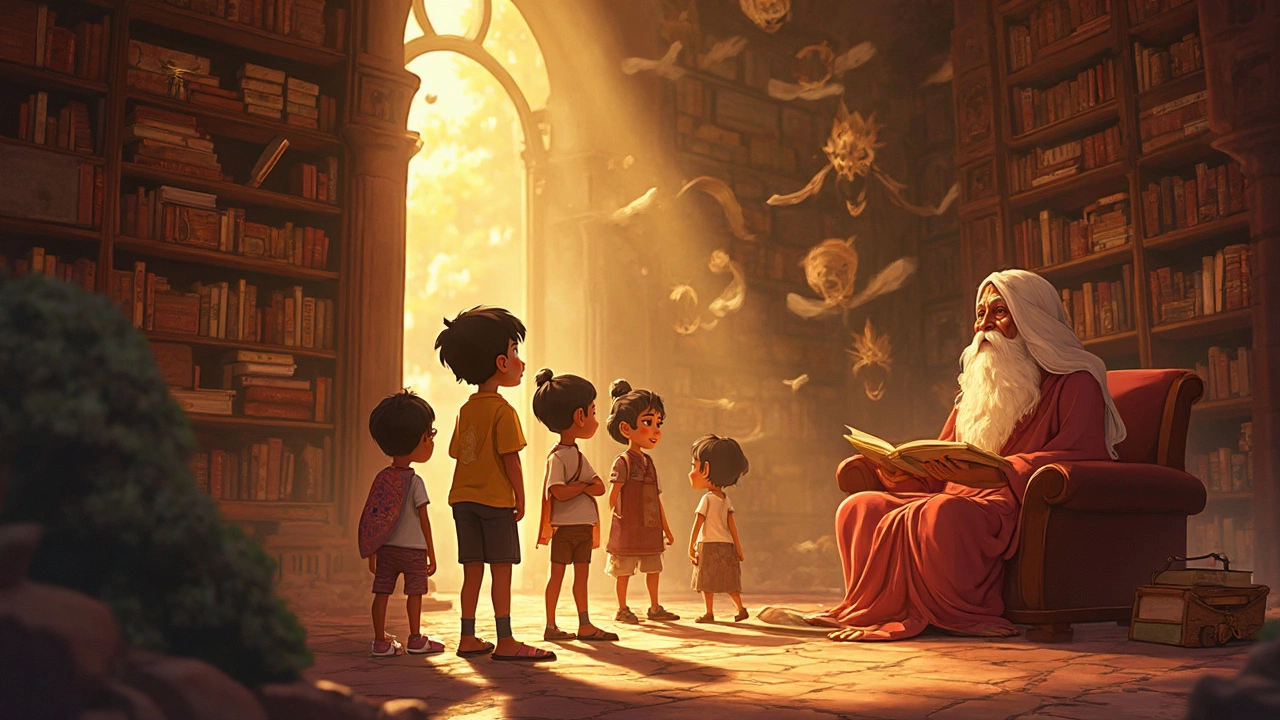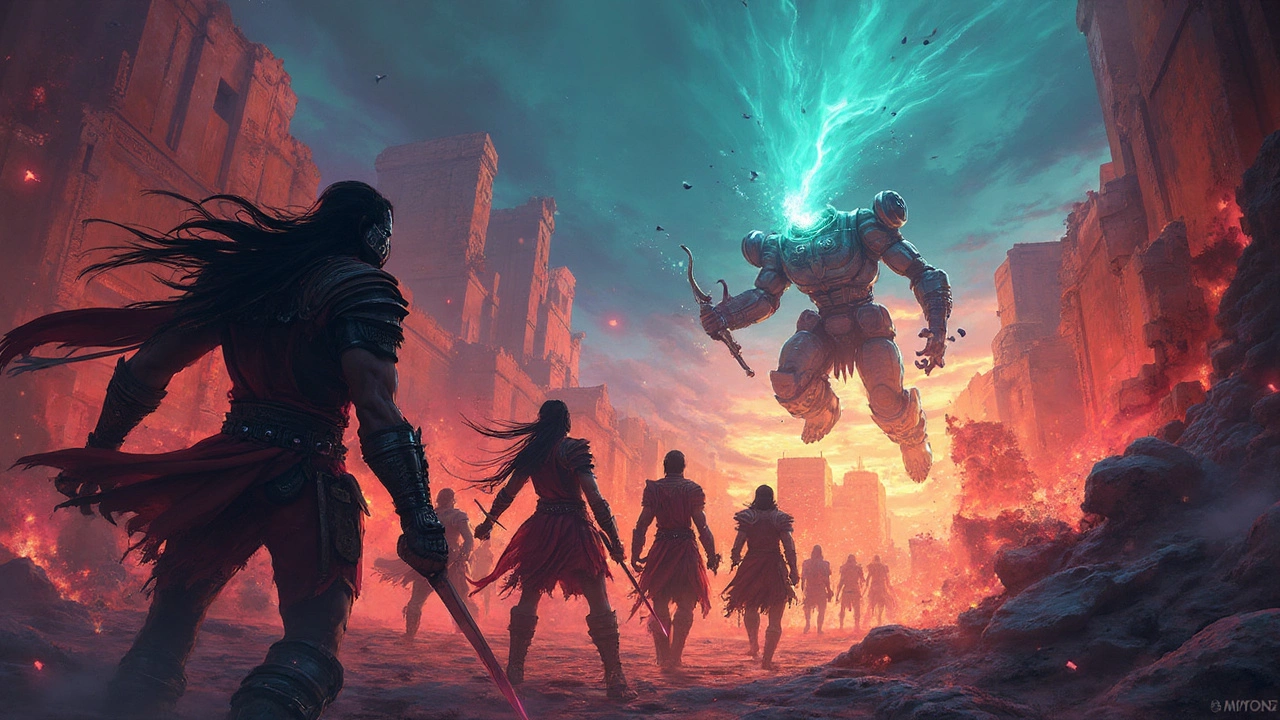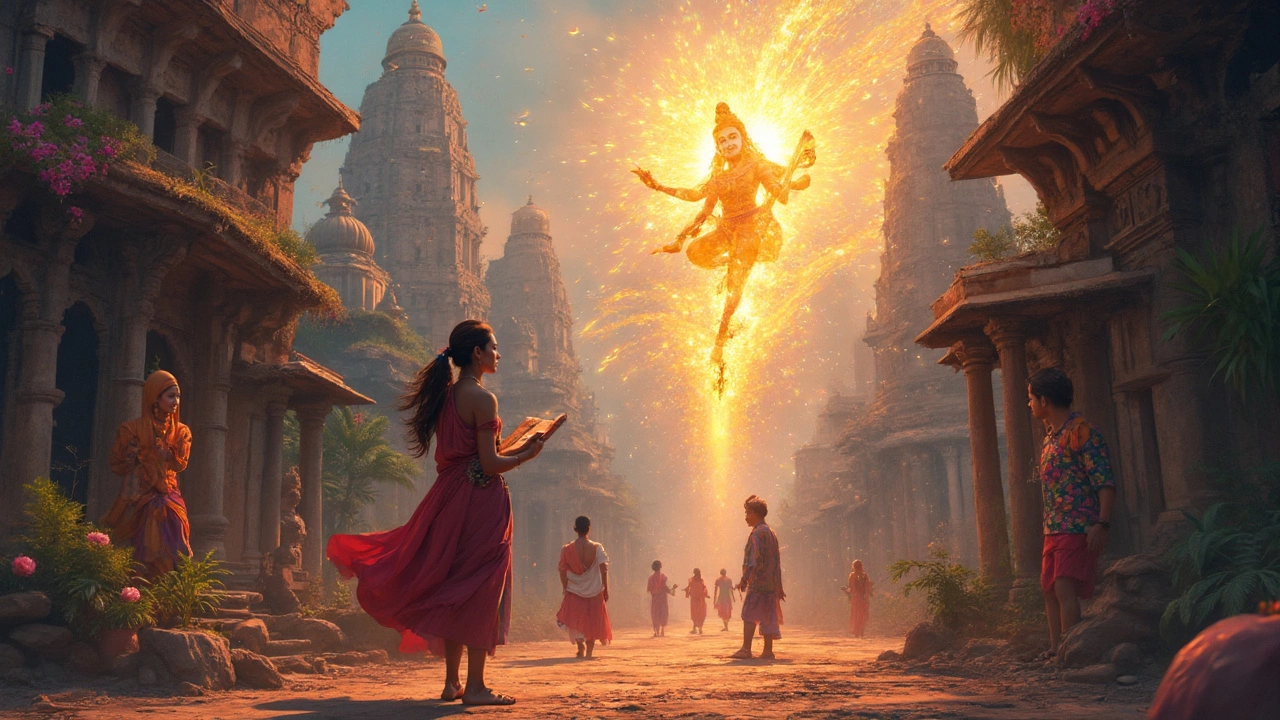Ever get the feeling that old myths just refuse to disappear? That’s basically the magic behind myth fiction. Ancient stories—Zeus’s wild tantrums, clever fox gods from Japan, snake-haired monsters—keep popping up, but these days they’re crashing through city streets or showing up in high school lunchrooms.
Myth fiction isn’t just about recycling old tales. It’s about taking those legendary characters and throwing them into new situations, often with a modern twist. This means you might read about a Norse god struggling with rush hour, or a Greek hero dealing with social media drama. That blend of worlds is what makes myth fiction so addictive and relatable. If you’ve ever read Percy Jackson or Neil Gaiman’s American Gods, you already know the thrill of seeing ancient legends shake things up in a world that looks a lot like ours.
- What Makes a Story ‘Myth Fiction’?
- Classic Myths Meet Modern Writers
- Why Are Readers Drawn to Myth Fiction?
- Tips for Diving Into Myth Fiction
- Creating Your Own Myth-Inspired Stories
What Makes a Story ‘Myth Fiction’?
At its core, myth fiction mashes up ancient myths with modern storytelling. It takes pieces from old legends—think gods, creatures, epic quests—and drops them into worlds we recognize, or builds brand-new ones. But here’s the catch: not every book with a nod to an old god is truly myth fiction. The best examples weave classic myth elements into the actual story, not just as decoration. It’s about how these elements interact with the plot, the setting, and even the main characters’ struggles.
Some writers use myth fiction as a playground to ask what would happen if ancient magic and monsters crashed into everyday life. This could mean the Greek Furies running a detective agency, or a shapeshifting African trickster guiding a teenager in New York. If the myth influences the heart of the story—not just the window dressing—it belongs in this genre.
Here’s what really sets myth fiction apart:
- Familiar Roots: Stories connect to well-known myths: Greek, Norse, Egyptian, Celtic, Hindu, Japanese—you name it.
- Reworked Legends: Instead of retelling, the stories reinvent: old gods get day jobs, monsters switch sides, ancient prophecies update for today.
- Blending Settings: Myth clashes with real cities, or creates fantasy worlds where old and new mix.
- New Voices: Modern issues show up: identity, belonging, justice. Myths become metaphors for real-life problems.
To break it down, look here:
| Myth Fiction Element | Typical Example |
|---|---|
| Old Myth Characters | Loki as an urban magician |
| New Story Arcs | Persephone dealing with climate change |
| Contemporary Settings | Anansi the spider texting memes |
Myth fiction hits hardest when the myth isn’t just a story in the background; it’s what moves everything forward. Readers connect because these stories show that what mattered centuries ago—love, power, revenge, hope—still hits home today.
Classic Myths Meet Modern Writers
It’s one thing to learn about Hercules cleaning stables or Thor smashing stuff in school. But when modern writers roll up their sleeves and mess with these old stories, things get wild. Neil Gaiman, for example, dove straight into Norse mythology with his novel American Gods, making gods live awkwardly among regular people. In Gaiman’s world, ancient deities work normal jobs and face problems no one ever saw coming in old scrolls.
Then there’s Rick Riordan, who turned ancient Greek tales into top-selling fun with his Percy Jackson & the Olympians series. Suddenly, Poseidon’s son is riding subways and battling monsters in New York. These books got so popular that more than 180 million copies flew off the shelves by 2023. Even folks who thought they’d never care about Greek myths started looking up Medusa and Cyclops just to keep up.
"Myths are public dreams, dreams are private myths." — Joseph Campbell
Modern writers aren’t just sticking to European legends. Writers like N.K. Jemisin blend African, Egyptian, and other stories to give readers fresh angles and new heroes. In her Inheritance Trilogy, gods walk among mortals but their struggles deal with issues like power and identity—not just lightning bolts and monsters.
It’s not all fiction for kids, either. Madeline Miller’s Circe (nominated for the Women’s Prize for Fiction in 2019) pulled a lesser-known figure from Greek myth right into the literary spotlight—showing how these old tales can break away from the usual gods-and-monsters action and dive into character growth.
Here’s a quick look at some standout myth fiction from the last two decades:
| Title | Author | Mythology Used | Year Published |
|---|---|---|---|
| Percy Jackson & the Olympians | Rick Riordan | Greek | 2005–2009 |
| American Gods | Neil Gaiman | Norse/Multiple | 2001 |
| The Inheritance Trilogy | N.K. Jemisin | Inspired by African/Egyptian | 2010–2011 |
| Circe | Madeline Miller | Greek | 2018 |
Writers today use myth fiction to retell and reshape legends, packing them with issues and feelings people actually have now. The result? Stories that grab both history nerds and folks just looking for a great read.

Why Are Readers Drawn to Myth Fiction?
Readers can’t seem to get enough of myth fiction because it turns the familiar into something new. These stories let you meet gods and monsters but put them in places you recognize—think supermarkets and subways instead of distant Mount Olympus. That mix of ancient and modern helps people connect with old characters in a way that feels fresh and exciting.
One big reason folks enjoy myth fiction is that it delivers adventure with a twist of recognition. You already kind of know Loki or Medusa—but seeing them text or ride a bus? That’s fun. There’s also something comforting about myths—they tap into big questions everyone has, like what makes someone a hero or how to handle loss and change. Myth fiction brings those questions to life in ways that aren’t preachy or dry.
Just look at recent bestsellers. The Percy Jackson series has sold more than 180 million copies worldwide, and Neil Gaiman’s "American Gods" has won awards and even got its own TV series. People don’t just want fantasy—they want the weight of history mixed with today’s chaos.
Check out how myth fiction stacks up in popularity:
| Book Title | Copies Sold (Millions) | Notable Element |
|---|---|---|
| Percy Jackson & the Olympians | 180+ | Greek gods in the modern U.S. |
| American Gods | ~5 | Old gods in a road trip across America |
| The Lightning Thief | 20 (first book alone) | Kid finds out he’s the son of Poseidon |
Myth fiction isn’t going out of style anytime soon. It gives people a way to see the world through magical eyes while dealing with everyday stuff. If you love both epic battles and awkward high school dances, this genre probably has something you’ll dig.
Tips for Diving Into Myth Fiction
If you’re curious about myth fiction, you don’t need to be an expert in ancient cultures or lug around a pile of old mythology books. You just need a starting point and maybe a few tricks to get the most out of this wild genre.
- Start with big-name series or standalone books. If you’re not sure where to begin, grab something popular like Rick Riordan’s Percy Jackson series or Neil Gaiman’s American Gods. Both are super accessible and have pretty active fan communities.
- Mix fiction and factual research for a richer experience. It can be fun and eye-opening to Google a god or creature you spot in your book. Did you know Medusa’s story pops up in more than 20 different modern novels? Tracking those appearances makes for some good trivia.
- Look for stories outside Greek and Norse myths. Japanese, West African, and South American myths are everywhere in new fiction—Nnedi Okorafor and Roshani Chokshi do awesome stuff with these less mainstream legends.
- Join online groups and book clubs focused on myth fiction. Reddit’s /r/Mythology, Goodreads lists, and even TikTok have reads and discussions going all the time. You’ll get recommendations fast and avoid books that just rehash old stuff.
- Don’t stress if you don’t catch every reference. Some writers get deep into mythology, but you don’t need to track every hero’s family tree. Focus on what’s cool or weird or just plain fun.
If you’re wondering how all these mythical mashups are doing, check out this quick look at recent sales and trends:
| Year | Top Myth Fiction Books Sold (US, in millions) | Genre Growth (%) |
|---|---|---|
| 2021 | 7.4 | 5 |
| 2022 | 8.3 | 12 |
| 2023 | 10.1 | 22 |
| 2024 | 12.6 | 25 |
The numbers show the genre’s getting hotter every year. Jump in now and you’ll have plenty to explore—and maybe even a few myth-inspired stories of your own brewing in your head.

Creating Your Own Myth-Inspired Stories
Diving into the world of myth fiction isn’t just for big-name authors. Anyone can experiment with these legendary tales, as long as you’re ready to have some fun and break a few rules. But where do you even start?
First, pick a myth that actually grabs you. It might be something wild, like Maui fishing up islands in the Pacific, or something gritty, like Anansi the spider tricking his way out of trouble. If the story makes you smile, roll your eyes, or imagine What if?, you’ve found a good place to dig in.
Next, swap settings. The old myths happened thousands of years ago, but you don’t have to set your story in ancient temples or misty forests. What if Medusa worked at a hair salon? What if Thor had to use public transport? Let these ideas shake things up.
- Mix myth with real life: Give mythological characters modern jobs, friends, or fears. Achilles dealing with gym injuries is suddenly way more relatable.
- Change the point of view: Tell a story from the monster’s side. Maybe the dragon is tired of heroes showing up all the time.
- Borrow, but don’t copy: Take the main theme or moral of a myth and twist it. Maybe rewrite King Arthur’s loyalty in the age of social media or a world where everyone’s trying to go viral.
Some folks worry about copyright, but most myths—from Greek, Norse, Indian, and Egyptian legends—are so old, they sit safely in the public domain. No need to stress about getting sued by the gods or their lawyers.
If you want a peek at what works in bestselling myth fiction, check out these numbers from 2024’s US book sales of popular titles:
| Title | Author | Year | US Copies Sold |
|---|---|---|---|
| The Lightning Thief | Rick Riordan | 2005 | 230,000 |
| Circe | Madeline Miller | 2018 | 164,000 |
| American Gods | Neil Gaiman | 2001 | 92,000 |
Don’t overthink the process. Legendary stories have survived for centuries because they change with the times. The best tip? Write something you’d actually want to read. There’s an audience out there hungry for new mythic adventures with a modern twist.

